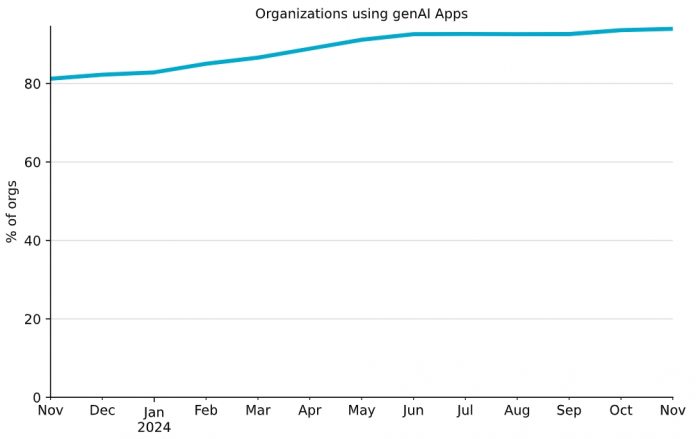The adoption of generative AI tools surged to new heights in 2024, with 94% of organizations integrating at least one AI application, according to Netskope’s Cloud and Threat Report.
This sharp rise highlights the growing reliance on AI-powered solutions to enhance productivity, streamline workflows, and foster innovation. OpenAI’s ChatGPT remains the most widely used tool, but rivals such as Microsoft Copilot and Google Gemini are quickly closing the gap, offering enterprises diverse and specialized options in this competitive space.
“The adoption of generative AI tools has surged as organizations increasingly rely on them for productivity, coding, and communication,” the report stated, underscoring how AI has transitioned from an emerging technology to a core enterprise asset.
With businesses now deploying an average of 9.6 generative AI applications—up from 7.6 in 2023—these tools are fundamentally reshaping how organizations operate.
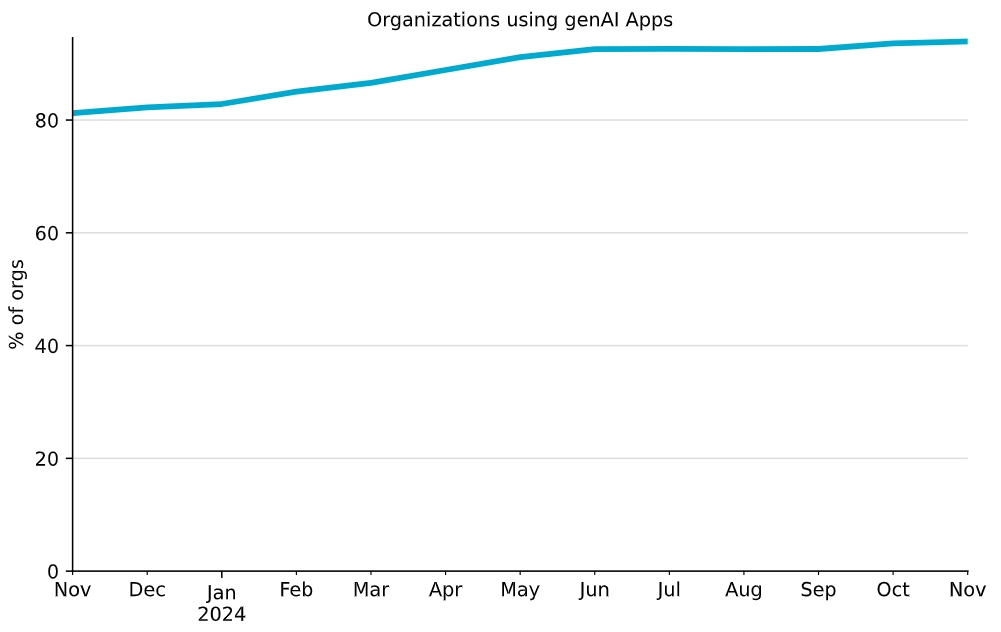

Generative AI has become indispensable across industries, with its adoption expanding from early adopters in the technology sector to traditional industries such as banking and education.
This widespread usage is driven by the diverse capabilities of AI tools, which now span everything from drafting emails and generating code to providing customer insights and automating workflows.
Related: Phishing Click Rates Triple in 2024 as Cybercriminals Exploit AI
ChatGPT Leads the Market, but Competitors Are Rapidly Gaining Ground
ChatGPT maintains its lead in the generative AI space, with 84% of organizations leveraging the tool for a variety of tasks. Its ability to handle brainstorming, content creation, and technical support has cemented its role as a staple in enterprise environments. However, the competition is intensifying.
Microsoft Copilot, which is integrated into Office 365 and GitHub, now serves 50% of organizations. Its seamless integration into widely used platforms makes it a valuable asset for productivity and software development, particularly in technology-focused sectors.
Related: AI Safety Index 2024 Results: OpenAI, Google, Meta, xAI Fall Short; Anthropic on Top
Google Gemini has also emerged as a strong contender, adopted by 53% of organizations. As part of Google’s Workspace ecosystem, Gemini delivers advanced conversational capabilities and data-driven insights, positioning itself as a key tool for enterprises relying on Google’s productivity suite.
Grammarly, an established leader in AI-assisted writing, continues to hold a strong position with a 57% adoption rate, but rising players such as Perplexity AI (47%) and GitHub Copilot (35%) are challenging its dominance.
Related: Grok AI Expands xAI Ecosystem with iOS App Launch
Specialized tools like the VEED AI video editor and Gamma, an AI tool for presentations, are also gaining traction, offering unique features for multimedia content creation and enhanced productivity.
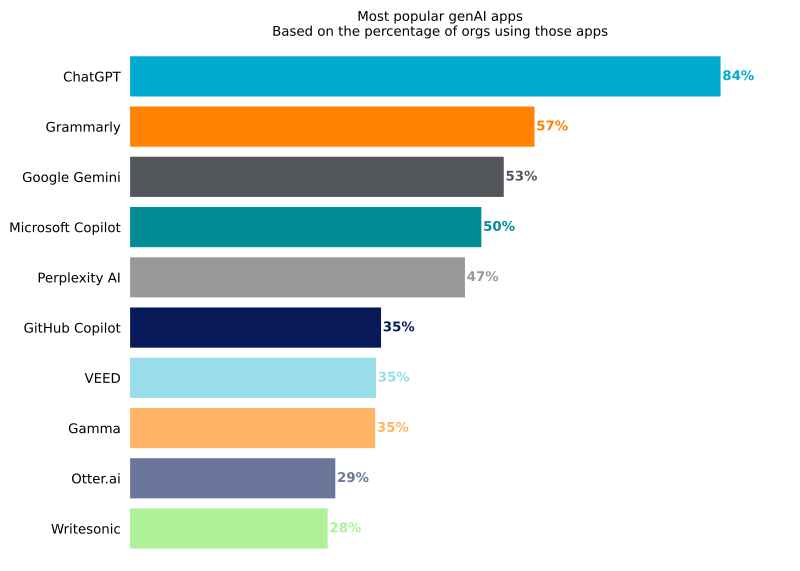

The competitive landscape of generative AI reflects a broader trend: enterprises are increasingly diversifying their AI portfolios. Organizations in the top quartile of adoption report using more than 20 generative AI apps, underscoring the growing reliance on these tools to meet specific business needs.
This diversification also speaks to the dynamic nature of the market, where innovation continues to drive adoption.
Sector-Specific Adoption Trends Highlight Growing Workforce Engagement
Adoption rates vary significantly across industries, with technology and retail leading the way. In the retail sector, over 34% of employees actively use generative AI tools to enhance customer interactions and optimize operations.
Technology companies, known for their early adoption of cutting-edge solutions, deploy an average of 24 generative AI tools, far exceeding the median of 10 reported across all industries. These firms rely on AI to accelerate software development, improve collaboration, and drive innovation.
Related: Google DeepMind Forms Specialized Team for AI World Models
In contrast, sectors such as banking, government, and education face unique challenges, including regulatory requirements and data privacy concerns, which slow the pace of adoption.
However, even these traditionally cautious industries have embraced generative AI, with adoption rates exceeding 85%. This broad acceptance underscores the transformative potential of AI applications, even in highly regulated environments.
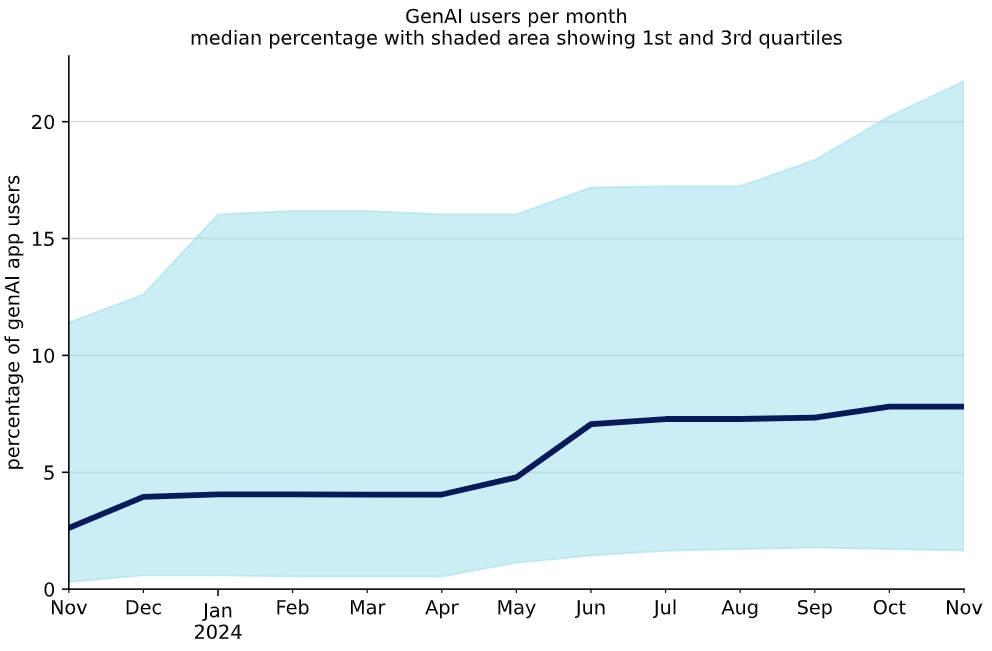

The consistent growth in user-level engagement highlights the increasing accessibility and utility of generative AI tools. As organizations adopt these solutions, they are empowering employees to work more efficiently and creatively, fostering a culture of innovation across their workforces.
Rising Usage Reflects Expanding AI Toolkits in Enterprises
The number of generative AI applications deployed per organization has grown steadily throughout 2024. The median rose from 9 apps in January to 10 by November, with the top quartile of adopters exceeding 20 tools.
This upward trend is driven by the continuous introduction of specialized tools that address niche requirements, from conversational AI to multimedia production.
“Generative AI has gone from an emerging technology to an enterprise mainstay in just a few years,” the report noted, emphasizing the rapid pace of adoption and the transformative role these tools play in modern organizations.
Related: Nvidia Unveils AI Gaming Characters That Plan and Act Like Human Players
The broad range of use cases—spanning marketing, operations, and IT—demonstrates the versatility of generative AI solutions and their ability to adapt to diverse enterprise needs.
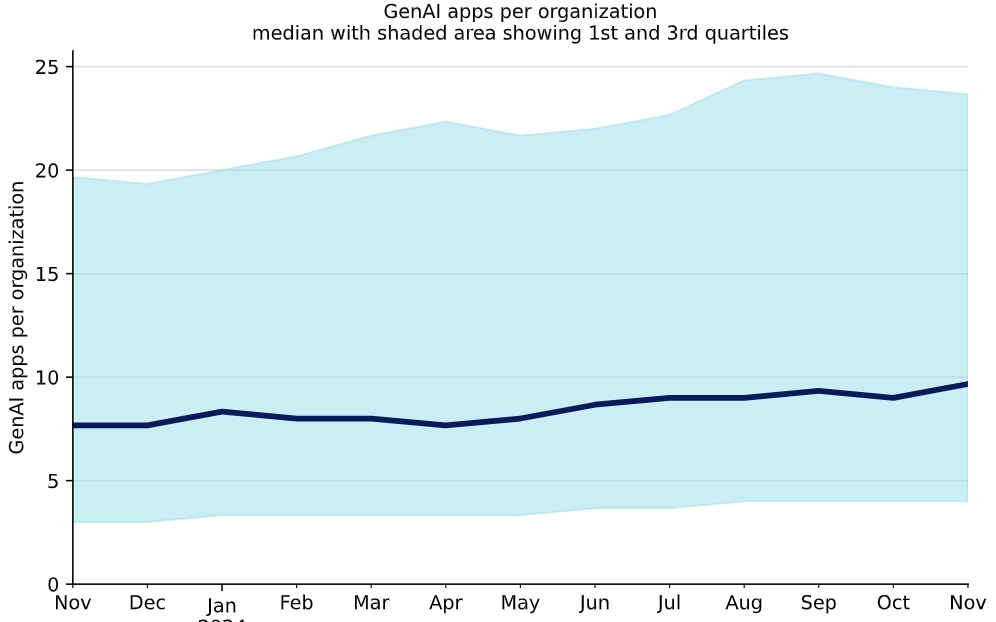

This growth in adoption is not without its challenges. As enterprises expand their AI toolkits, they must also manage the complexities of integration, security, and compliance, particularly as AI tools become more deeply embedded in core business processes.
Balancing Benefits with Risks
While generative AI tools offer undeniable benefits, their adoption comes with inherent risks. Netskope’s report highlights a rise in policy violations, with sensitive data—such as source code, financial records, and regulated information—frequently uploaded to AI platforms without adequate oversight.
To address these risks, 99% of organizations have implemented security measures, including real-time user coaching and data loss prevention (DLP) policies.
Related: OpenAI’s $200 ChatGPT Pro Plan Bleeds Money, Worsening Operating Loss
The sophistication of generative AI tools also makes them attractive to cybercriminals, who may exploit them for phishing or other malicious activities. This underscores the need for robust security protocols to safeguard sensitive information and ensure compliance with regulatory standards.
“The sophistication of AI tools makes them indispensable, but organizations must adopt robust strategies to protect sensitive data and ensure compliance,” the report stated, emphasizing the dual responsibility of leveraging AI’s potential while mitigating its risks.
The Competitive Race Spurs Innovation
As the generative AI market evolves, competition among key players continues to drive innovation. OpenAI, Microsoft, and Google dominate the market, but emerging players are reshaping the landscape with unique offerings.
Perplexity AI, VEED, and Gamma are carving out niches with specialized tools designed for research, multimedia creation, and enhanced productivity.
Related: Microsoft to Spend $80 Billion on AI Infrastructure in 2025
The chart tracking app usage across organizations shows how these tools are gaining traction. While ChatGPT retains its lead, the growing popularity of competitors demonstrates the dynamic nature of the market.
This trend reflects a broader shift in enterprise AI strategies, as organizations seek to diversify their toolkits to address specific needs and optimize performance.
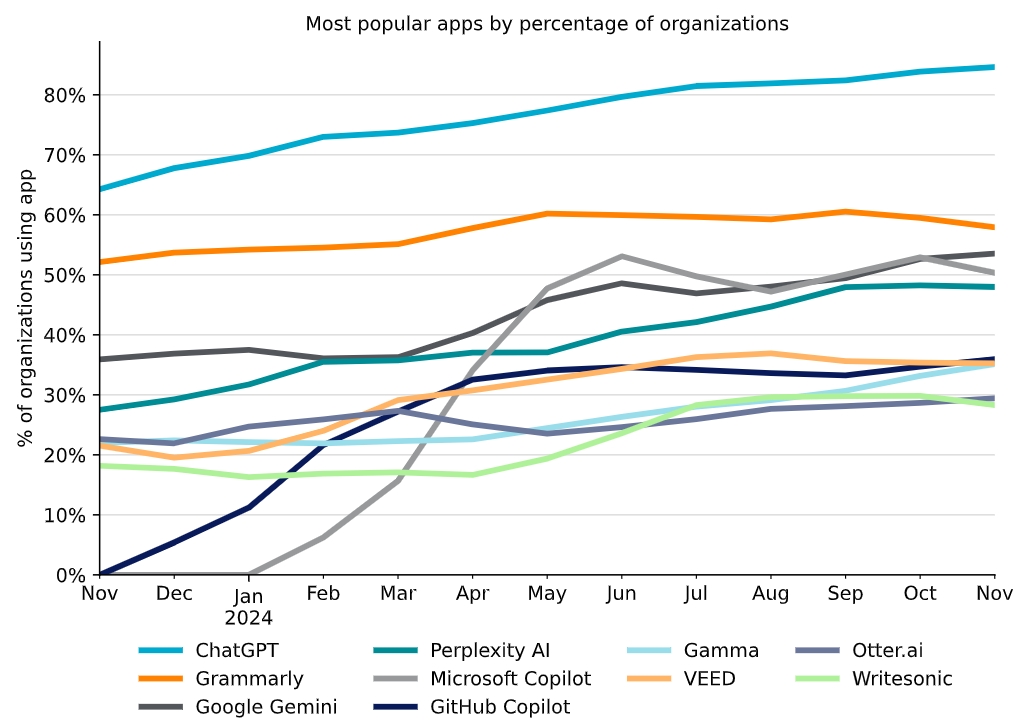

Generative AI tools have become essential to enterprise operations, with adoption reaching near-universal levels in 2024. ChatGPT continues to lead the market, but competitors like Microsoft Copilot and Google Gemini are closing the gap, offering innovative solutions tailored to diverse enterprise needs.

